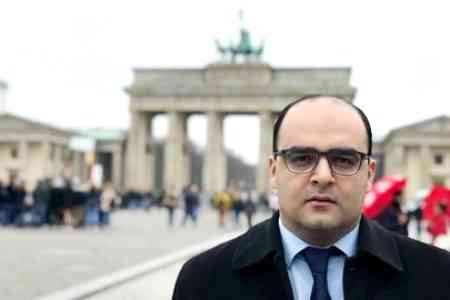


ArmInfo. The meeting between the head of the Armenian Foreign Ministry and the managing director of Westinghouse Electric Sweden in Stockholm on November 11, once again demonstrated Yerevan's commitment to transition the Armenian "peaceful atom" to Western rails, a move that poses risks to the country's energy security.
A similar viewpoint was expressed by Vahe Davtyan, Doctor of Political Science, regarding the shift of Armenia's nuclear program to Western rails. The expert mentioned that Westinghouse Electric Sweden is a subsidiary of the American Westinghouse Electric - the largest company in the US nuclear energy market, as well as one of the world's leading producers of nuclear fuel.
At the same time, Davtyan believes that this meeting itself will not be significant, unless considered in the context of several decisions made by Yerevan in recent years. In this regard, he particularly highlighted the Armenian government's rejection of a Russian loan for the modernization of the Armenian Nuclear Power Plant in 2020, the agreement signed with Washington to launch a strategic dialogue in 2022, focusing on cooperation in "civil nuclear energy", as well as the Prime Minister of Armenia's recent statement about the "strategic decision to construct a small modular nuclear power plant", with negotiations primarily held with Washington in recent years.
"In general, the situation is not without absurdity, and here's why. Currently, only two countries in the world have experience in the construction and operation of small modular nuclear power plants - Russia and China. The United States itself not only lacks small nuclear power plants, but since the 1979 accident at the Three Mile Island nuclear power plant, it has not implemented a single large nuclear project," the political scientist noted. He also raised a rhetorical question about whether imposing a small nuclear power plant project on Yerevan implies that Washington sees Armenia as a testing ground for experiments?
"It should be noted that the Armenian government currently has a project proposed by Rosatom for the construction of a high-capacity conventional NPP on its table. Given that the service life of the current unit of the Armenian NPP will be extended until 2036, Yerevan needs to begin design work now - without geopolitical curtseys and taking into account the extensive experience of cooperation with the Russian state corporation, a common scientific school and a regional security framework," Davtyan believes.
It should be noted that earlier today, in an interview with ArmInfo, Yuri Sviridenko, the Head of the Integrated Projects Department of Rosatom Service JSC, stated that, as of today, the Rosatom State Corporation has references for small modular reactors. This is evidenced by the floating NPP in Pevek, the small NPP under construction in Yakutia and Rosatom's first export contract in the world for the construction of a low-capacity NPP in Uzbekistan. These represent practically all the SMR NPPs in the world, not including Russian icebreakers that use similar reactors. In other words, Russia has accumulated a significant amount of unique experience in working with SMRs. Most of the examples outside the country, with the exception of China, are either at the design project level or in the process of obtaining design licenses.